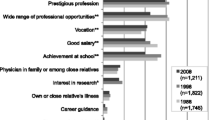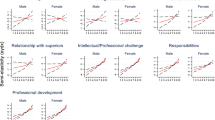Abstract
In this longitudinal study, we investigated the relationship between physicians’ prior achievements (before, during and after medical school) and job satisfaction, and tested the two lines of reasoning that prior achievements influence job satisfaction positively or negatively, respectively. The participants were graduates who started their medical training in 1982 (n = 147), 1983 (n = 154), 1992 (n = 143) and 1993 (n = 153). We operationalised job satisfaction as satisfaction (on a 10-point scale) with 13 cognitive, affective and instrumental aspects of the participants’ jobs. The measures of achievement before, during and after medical school included pre-university grade point average, study progress and a residency position in the specialty of first choice, respectively. We included the effect of curriculum type (problem-based learning versus traditional), gender and years of experience as moderator variables. Higher achievers before and during medical school were more satisfied about their income (β = .152, p < .01 and β = .149, p < .05), but less satisfied with their opportunities for personal development (β = −.159, p < .05). High achievers after medical school were more satisfied with professional accomplishments (β = .095, p < .05), with appreciation from support personnel (β = .154, p < .01) and from patients (β = .120, p < .05). Effect sizes were small. Prior achievements influenced job satisfaction. The direction of the influences depended on the job satisfaction aspect in question, which indicates that it is important to distinguish between aspects of job satisfaction. To optimize job satisfaction of high achievers, it is important for graduates to obtain their preferred specialty. Furthermore, it is vital to provide them with enough opportunities for further development.
Similar content being viewed by others
References
Bautista, L. G. (2012). The affordable care act and the primary care physician shortage. Bulletin of Health Policy and Law, 1, e10.
Borges, N. J., Gibson, D. D., & Karnani, R. M. (2005). Job satisfaction of physicians with congruent versus incongruent specialty choice. Evaluation and the Health Professions, 28, 400–413.
Brewer, M. B. (2007). The importance of being we: Human nature and intergroup relations. American Psychologist, 62, 728–738.
Brown, S., & Gunderman, R. B. (2006). Viewpoint: Enhancing the professional fulfillment of physicians. Academic Medicine, 81, 577–582.
Buchbinder, S. B., Wilson, M., Melick, C. F., & Powe, N. R. (1999). Estimates of costs of primary care physician turnover. The American Journal of Managed Care, 5, 1431–1438.
Byrne, D., Clore, G., & Smeaton, G. (1986). The attraction hypothesis: Do similar attitudes affect anything? Journal of Personality and Social Psychology, 51, 1167–1170.
Carr, J. Z., Schmidt, A. M., Ford, J. K., & DeShon, R. P. (2003). Climate perceptions matter: A metaanalytic path analysis relating molar climate, cognitive and affective states, and individual level work outcomes. Journal of Applied Psychology, 88, 605–619.
Cohen, J. (1992). A power primer. Psychological Bulletin, 112, 155–159.
Cohen-Schotanus, J. (1994). Effecten van curriculumveranderingen: studiewaardering, studeergedrag, kennis, studiedoorstroom in een veranderd medisch curriculum. (Effects of curriculum change: Appreciation, study behaviour, knowledge and study progress in a changing medical curriculum. In Dutch). Dissertation, Groningen: (Sl: sn).
Cohen-Schotanus, J., Muijtjens, A. M. M., Reinders, J. J., Agsteribbe, J., van Rossum, H. J. M., & van der Vleuten, C. P. M. (2006). The predictive validity of grade point average scores in a partial lottery medical school admission system. Medical Education, 40, 1012–1019.
Cohen-Schotanus, J., Muijtjens, A. M. M., Schönrock-Adema, J., Geertsma, J., & van der Vleuten, C. P. M. (2008). Effects of conventional and problem-based learning on clinical and general competencies and career development. Medical Education, 42, 256–265.
DeVoe, J., Fryer, G. E., Hargraves, J. L., Phillips, R. L., & Green, L. A. (2002). Does career dissatisfaction affect the ability of family physicians to deliver high-quality patient care? Journal of Family Practice, 51, 223–228.
DiMatteo, M. R., Sherbourne, C. D., Hays, R. D., Ordway, L., Kravitz, R. L., McGlynn, E. A., et al. (1993). Physicians’ characteristics influence patients’ adherence to medical treatment: Results from the medical outcomes study. Health Psychology, 12, 93–102.
Dyrbye, L. N., & Shanafelt, T. D. (2011). Physician burnout: A potential threat to successful health care reform. The Journal of the American Medical Association, 305, 2009–2010.
Ferguson, E., James, D., & Madeley, L. (2002). Factors associated with success in medical school: Systematic review of the literature. British Medical Journal, 324(7343), 952–957.
Goldacre, M. J., Laxton, L., & Lambert, T. W. (2010). Medical graduates’ early career choices of specialty and their eventual specialty destinations: UK prospective cohort studies. British Medical Journal, 341, c3199.
Grembowski, D., Paschane, D., Diehr, P., Katon, W., Martin, D., & Patrick, D. L. (2005). Managed care, physician job satisfaction, and the quality of primary care. Journal of General Internal Medicine, 20, 271–277.
Grol, R., Mokkink, H., Smits, A., Van Eijk, J., Beek, M., Mesker, P., et al. (1985). Work satisfaction of general practitioners and the quality of patient care. Family Practice, 2, 128–135.
Haarhuis, J. C. M., Muijtjens, A. M. M., Scherpbier, A. J. J. A., & van Beukelen, P. (2009). An admissions system to select veterinary medical students with an interest in food animals and veterinary public health. Journal of Veterinary Medical Education, 36, 2–6.
Haas, J. S., Cook, E. F., Puopolo, A. L., Burstin, H. R., Cleary, P. D., & Brennan, T. A. (2000). Is the professional satisfaction of general internists associated with patient satisfaction? Journal of General Internal Medicine, 15, 122–128.
Hamilton, P. (2009). Recruitment to medical specialty training (England) 2010. BMJ Careers. http://careers.bmj.com/careers/advice/view-article.html?id=20000545. Accessed 18 April 2013.
Hojat, M., Kowitt, B., Doria, C., & Gonnella, J. S. (2010). Career satisfaction and professional accomplishments. Medical Education, 44, 69–76.
Kaufman, D. M., & Mann, K. V. (1996). Comparing students’ attitudes in problem-based and conventional curricula. Academic Medicine, 71, 1096–1099.
Keeton, K., Fenner, D. E., Johnson, T. R., & Hayward, R. A. (2007). Predictors of physician career satisfaction, work-life balance, and burnout. Obstetrics and Gynecology, 109, 949–955.
Kravitz, R. L. (2012). Physician job satisfaction as a public health issue. Israel Journal of Health Policy Research, 1, 51.
Kusurkar, R. A., Ten Cate, Th. J., Vos, C. M. P., Westers, P., & Croiset, G. (2013). How motivation affects academic performance: A structural equation modelling analysis. Advances in Health Sciences Education: Theory and Practice, 18, 57–69.
Lambrou, P., Kontodimopoulos, N., & Niakas, D. (2010). Motivation and job satisfaction among medical and nursing staff in a Cyprus public general hospital. Human Resources for Health, 8, 26.
Landon, B. E., Rechovsky, J. D., Pham, H. H., & Blumenthal, D. (2006). Leaving medicine: The consequences of physician dissatisfaction. Medical Care, 44, 234–242.
Linn, L. S., Brook, R. H., Clark, V. A., Davies, A. R., Fink, A., & Kosecoff, J. (1985). Physician and patient satisfaction as factors related to the organization of internal medicine. Medical Care, 23, 1171–1178.
Locke, E. A. (1976). The nature and causes of job satisfaction. In M. D. Dunnette (Ed.), Handbook of industrial and organizational psychology (pp. 1297–1349). Chicago: Rand McNally.
McManus, I. C., Smithers, E., Partridge, P., Keeling, A., & Fleming, P. R. (2003). A levels and intelligence as predictors of medical careers in UK doctors: 20 year prospective study. British Medical Journal, 327(7407), 139–142.
McMurray, J. E., Heiligers, P. J. M., Shugerman, R. P., Douglas, J. A., Gangnon, R. E., Voss, C., et al. (2005). Part-time medical practice: Where is it headed? The American Journal of Medicine, 118, 87–92.
Meir, E. I., & Melamed, S. (2005). Occupational specialty congruence: New data and future directions. Journal of Vocational Behavior, 67, 21–34.
Mennin, S. P., Kalishman, S., Friedman, M., Pathak, D., & Snyder, J. (1996). A survey of graduates in practice from the University of New Mexico’s conventional and community-oriented, problem-based tracks. Academic Medicine, 71, 1079–1089.
Metz, J. C. M., Stoelinga, G. B. A., Pels Rijcken-van Erp Taalman Kip E. H., & van den Brand-Valkenburg, B. W. M. (Eds). Blueprint 1994. training of doctors. Objectives of undergraduate medical education in the Netherlands [in Dutch]. Nijmegen: University Publication Office 1994.
Moos, R. H. (1973). Conceptualizations of human environments. American Psychologist, 28, 652–655.
Moos, R. H. (1974). The social climate scales: An overview. Palo Alto, CA: Consulting Psychologists Press.
Motowidlo, S. J., Packard, J. S., & Manning, M. R. (1986). Occupational stress: Its causes and consequences for job performance. Journal of Applied Psychology, 71, 618–629.
Myerson, N. (2003). Do school exams predict doctors’ success? Career achievements are not the only measure (letter). British Medical Journal, 327(7418), 810.
Ostroff, C. (1993). The effects of climate and personal influences on individual behavior and attitudes in organizations. Organizational Behavior and Human Decision Processes, 56, 56–90.
Petrozzi, M. C., Rosman, H. S., Nerenz, D. R., & Young, M. J. (1992). Clinical activities and satisfaction of general internists, cardiologists, and ophthalmologists. Journal of General Internal Medicine, 7, 363–365.
Psilopanagioti, A., Anagnostopoulos, F., Mourtou, E., & Niakas, D. (2012). Emotional intelligence, emotional labor, and job satisfaction among physicians in Greece. BMC Health Services Research, 12, 463.
Raine, T., McGinn, K., Dawson, J., Sanders, S., & Eccles, S. (2011). Oxford handbook for the foundation programme. Oxford: Oxford University Press.
Schuwirth, L. (2009). What costs complexity and what price simplicity? Medical Teacher, 31, 475–476.
SHM Career Satisfaction Task Force (2006). A challenge for a new specialty: a white paper on hospitalist career satisfaction. http://www.hospitalmedicine.org/AM/Template.cfm?Section=White_Papers&Template=/CM/ContentDisplay.cfm&ContentID=14631. Accessed 31 Aug 2011.
Sibbald, B., Bojke, C., & Gravelle, H. (2003). National survey of job satisfaction and retirement intentions among general practitioners in England. British Medical Journal, 326(7379), 22–25.
Smith, R. (2001). Why are doctors so unhappy? British Medical Journal, 322, 1073–1074.
Spiegel, W., Haoula, D., Schneider, B., & Maier, M. (2004). Allocation of training posts to applicants for postgraduate medical education in Austria: Survey and analysis. Academic Medicine, 79, 703–710.
Stringer, C., Didham, J., & Theivananthampillai, P. (2011). Motivation, pay satisfaction, and job satisfaction of front-line employees. Qualitative Research in Accounting and Management, 8, 161–179.
Van Ham, I., Verhoeven, A. A. H., Groenier, K. H., Groothoff, J. W., & de Haan, J. (2006). Job satisfaction among general practitioners: A systematic literature review. European Journal of General Practice, 12, 174–180.
Wallace, J. E., Lemaire, J. B., & Ghali, W. A. (2009). Physician wellness: A missing quality indicator. Lancet, 374, 1714–1721.
West, P. A. (2001). Calibre of people recruited to medicine may be too high for the job (letter). British Medical Journal, 322, 1361.
Williams, E. S., Manwell, L. B., Konrad, T. R., & Linzer, M. (2007). The relationship of organizational culture, stress, satisfaction, and burnout with physician-reported error and suboptimal patient care: results from the MEMO study. Health Care Management Review, 32, 203–212.
Williams, E. S., & Skinner, A. C. (2003). Physician job satisfaction: A narrative review, implications, and directions for future research. Health Care Manage Review, 28, 119–140.
Acknowledgments
We thank Nienke Boendermaker en Tessa Waslander for their help with performing the interviews. We also thank Tineke Bouwkamp-Timmer for her constructive comments and editorial help.
Author information
Authors and Affiliations
Corresponding author
Rights and permissions
About this article
Cite this article
Schmit Jongbloed, L.J., Schönrock-Adema, J., Borleffs, J.C.C. et al. The influence of achievement before, during and after medical school on physician job satisfaction. Adv in Health Sci Educ 19, 581–595 (2014). https://doi.org/10.1007/s10459-013-9489-x
Received:
Accepted:
Published:
Issue Date:
DOI: https://doi.org/10.1007/s10459-013-9489-x




